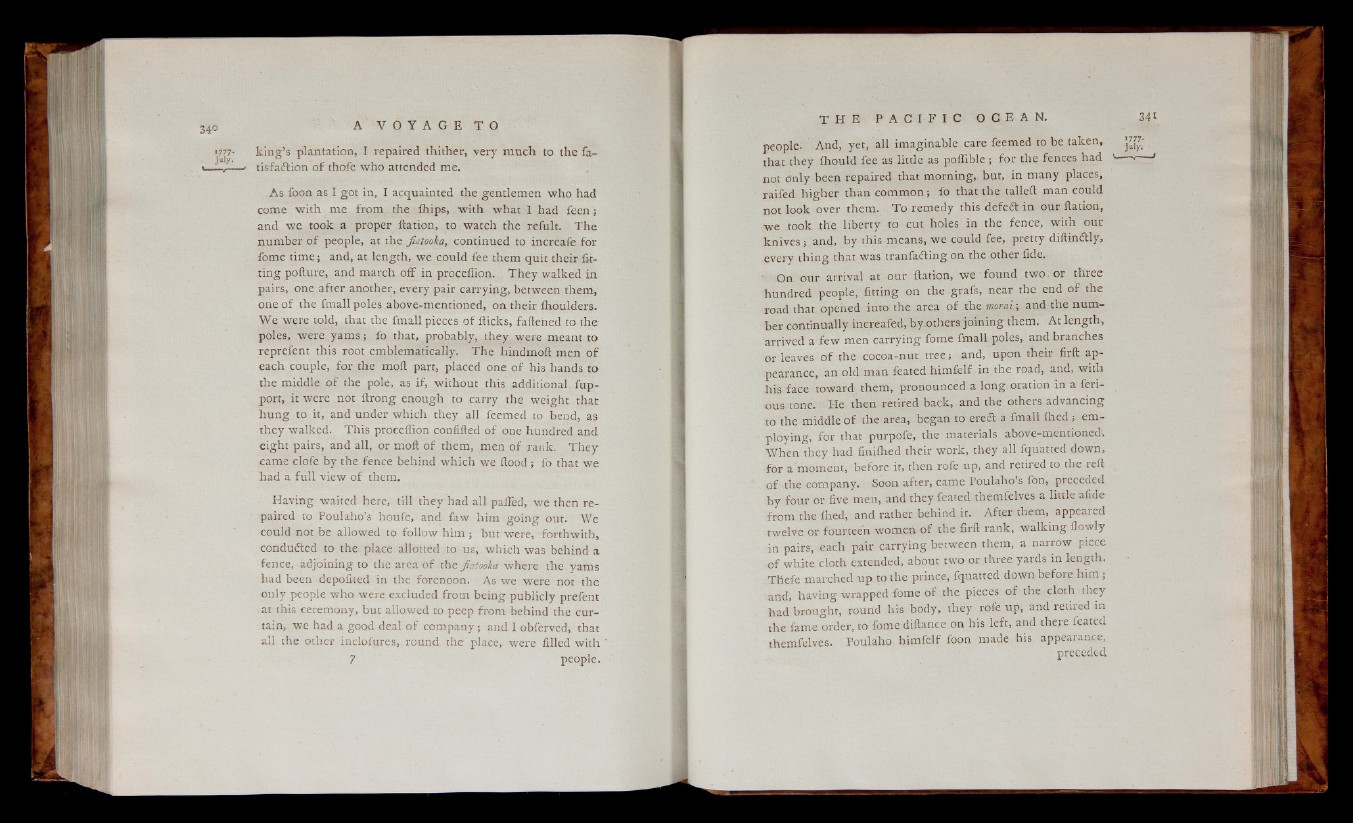
>777- king’s plantation, I repaired thither, very much to the fa-
— —■ tisfailion of thofe who attended me.
As foon as I got in, I acquainted the gentlemen who had
come with me from the ihips, with what I had feen ;
and we took a proper ftation, to watch the refult. The
number of people, at the fatooka, continued to increafe for
fome time; and, at length, we could fee them quit their fitting
pofture, and march off in proceffion. They walked in
pairs, one after another, every pair carrying, between them,
one of the fmall poles above-mentioned, on their ftioulders.
We were told, that the fmall pieces of flicks, fattened to the
poles, were yams; fo that, probably, they were meant to
reprefent this root emblematically. The hindmoft men of
each couple, for the moil part, placed one of his hands to
the middle of the pole, as if, without this additional fup-
port, it were not ftrong enough to carry the weight that
hung to it, and under which they all feemed to bend, as
they walked. This proceffion confifted of one hundred and
eight pairs, and all, or moll of them, men of rank. They
came clofe by the fence behind which we flood; fo that we
had a full view of them.
Having waited here, till they had all palled, we then repaired
to Poulaho’s houfe, and faw him going out. We
could not be allowed to follow him ; but were, forthwith,
conduced to the place allotted to us, which was behind a
fence, adjoining to the area of the fatooka where the yams
had been depofited in the forenoon. As we were not the
only people who were excluded from being publicly prefent
at this ceremony, but allowed to peep from behind the curtain,
we had a good deal of company; and I obferved, that
all the other inclofures, round the place, were filled with
7 people.
people. And, yet, all imaginable care feemed to be taken,
that they ihould fee as little as poffible; for the fences had •
not Only been repaired that morning, but, in many places,
raifed higher than common; fo that the tallefl man could
not look over them. To remedy this defecft in our ftation,
we took the liberty to cut holes in the fence, with our
knives; and, by this means, we could fee, pretty diftintttly,
every thing that was tranfafting on the other fide.
On our arrival at our ftation, we "found two. or three
hundred people, fitting on the grafs, near the end of the
road that opened into the area of the morai; and the number
continually increafed, by.others joining them. At length,
arrived a few men carrying fome fmall poles, and branches
or leaves of the cocoa-nut tree; and, upon their firft appearance,
an old man feated himfelf in the road, and, with
his face toward them, pronounced a long, oration in a feri-
ous tone. He then retired back, and the others advancing
to the middle of the area, began to ereit a fmall fhed ; employing,
for that purpofe, the materials above-mentioned.
When they had finifhed their work, they all fquatted down,
for a moment, before it, then rofe up, and retired to the reft
of the company. Soon after, came Poulaho’s fon, preceded
by four or five men, and they feated themfelves a little afide
from the fhed, and rather behind it. After them, appeared
twelve or fourteen women of the firft rank, walking flowly
in pairs, each pair carrying between them, a narrow piece
of white cloth extended, about two or three yards in length.
Thefe marched up to the prince, fquatted down before him;
and, having wrapped fome of the pieces of the cloth they
had brought, round his body, they rofe up, and retired in
the fame order, to fome diftance on his left, and there feated
themfelves. Poulaho himfelf foon made his appearance,